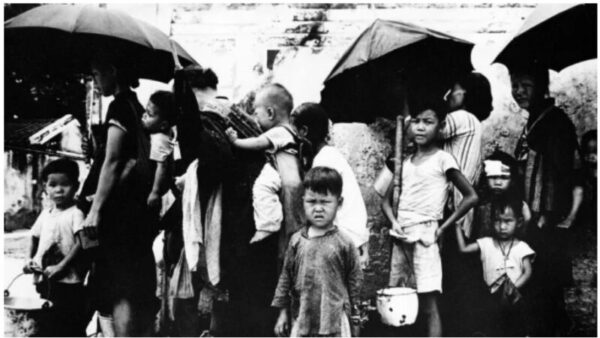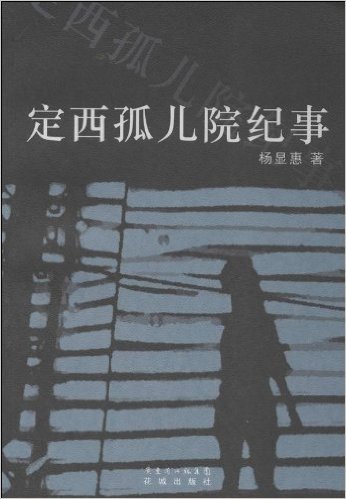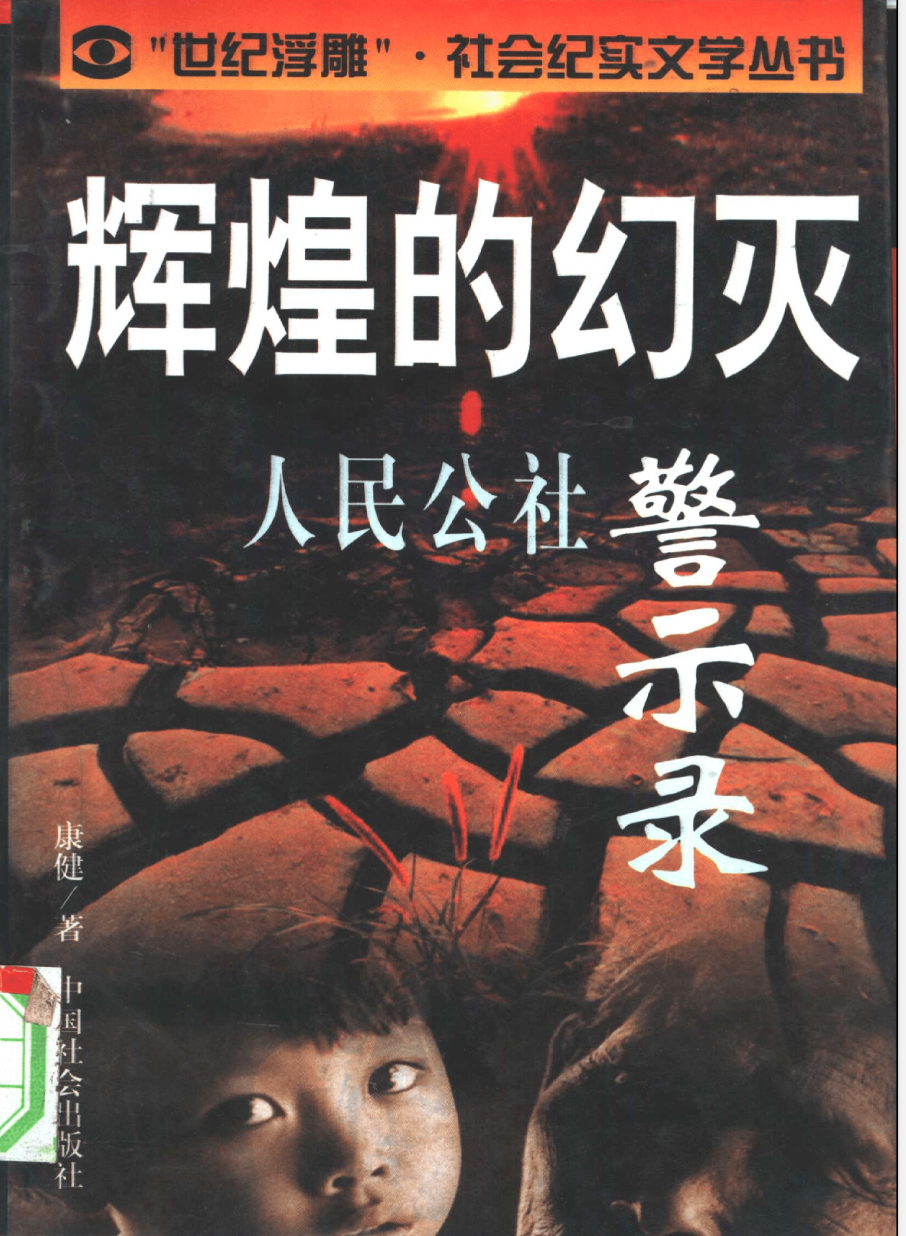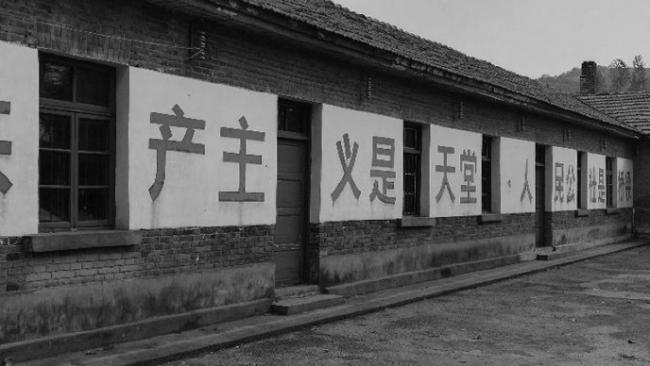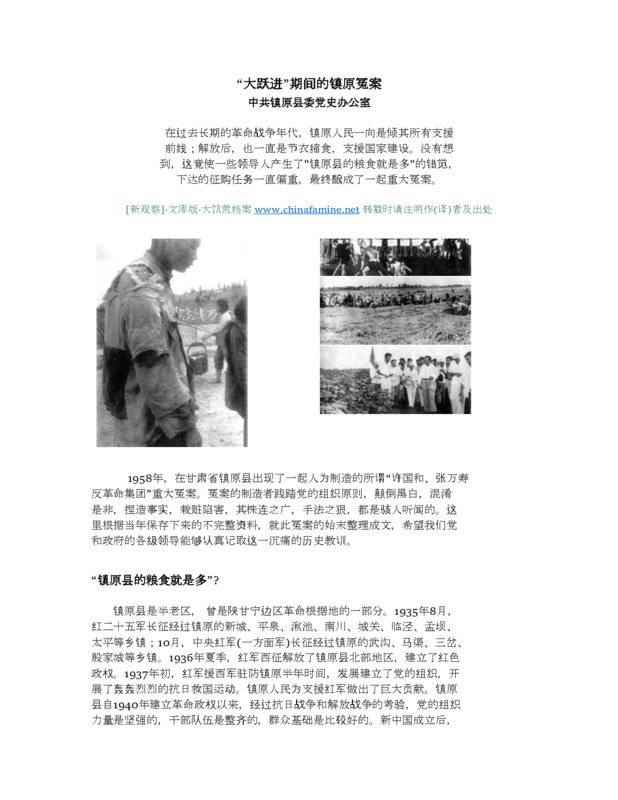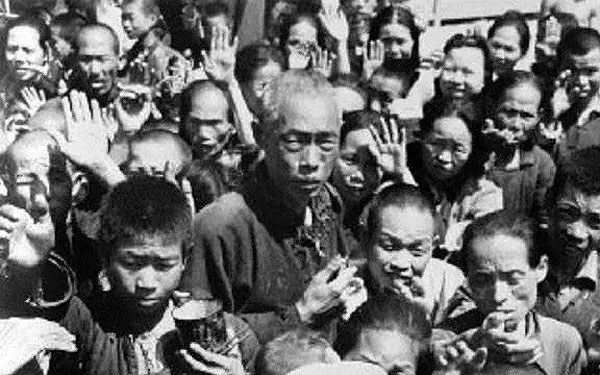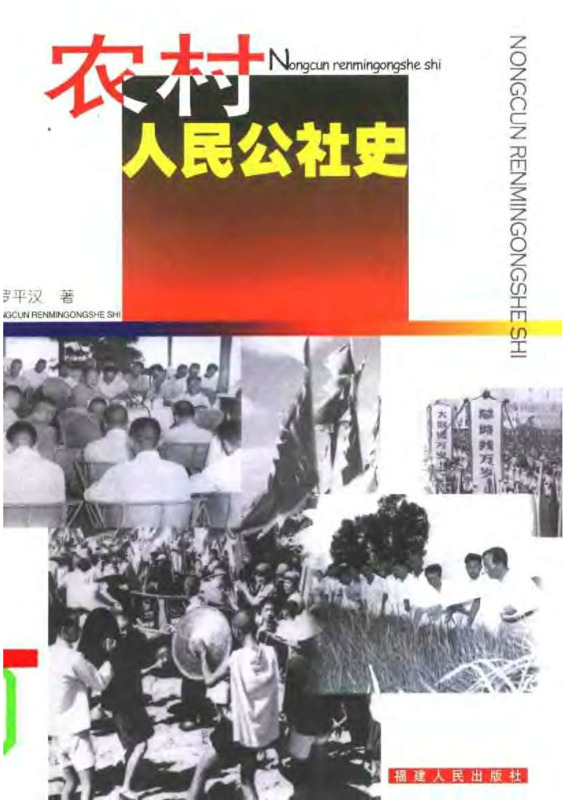Explore the collection
Showing 51 items in the collection
51 items
Book
At the Crossroads of History
This book is Gao Hua's next masterpiece after *How the Red Sun Rose*. It entails a selection of papers published by the author between 1988 and 2004, covering the fields of Republican history, Communist Party history, and contemporary Chinese history. It captures the historical interaction between the present and the past. Gao reflects deeply on the far-reaching Chinese Communist Revolution. With a rigorous and empirical research methodology, he sketches a complex and colorful picture of history, presenting the multiple facets of twentieth-century China's history.
Book
China's "Left Scourge"
The author of this book, Lu Jianhua (pen name Wen Lu), was a former member of the Chinese Academy of Social Sciences who published this book in 1993. He was sentenced to 20 years in prison in 2005 for "allegedly leaking state secrets" in connection with the "espionage case" involving journalist Cheng Xiang.
Book
Chronicle of Rural Remediation of Communes in Difficult Times
Two years after the Great Famine of 1958, the government sent "rectification" work teams of about 10,000 people to many of the most severely affected provinces, such as Henan, Shandong, Anhui, Guizhou, Sichuan, Qinghai, and Xinjiang. The author of this book, Hui Wen, had just graduated from Renmin University of China and was assigned to work at the Institute of Modern History of the Chinese Academy of Sciences for half a year. In December 1960, he was sent to Jianyang, Sichuan to participate in the whole society. The book records what he saw during this period. heard.
Hui Wen came into contact with a large number of farmers and witnessed the situation of rural areas on the front line. Each article in the book records the date, place and passage of writing at that time, which adds to the history and authenticity of the book. After the Cultural Revolution ended in 1976, the author compiled these records into a volume. Through a case study of Jianyang, this book uses specific historical details to reflect the relationship between the Great Leap Forward policy and the Great Famine.
After the book was completed, due to China's strict publishing censorship system, the author did not submit it to a publishing organization and chose to circulate it among friends first. Later, he handed the manuscript to the website "China's Great Famine Archives," and this historical record was made public to the world.
Book
Chronicle of the Dingxi Orphanage
After the disaster in Dingxi Prefecture, which was the hardest-hit area of Gansu Province during the 1958-1960 famine, a children's welfare institution was urgently set up in Dingxi Prefecture to take in hundreds of orphans. During the same period, children's welfare centers or "kindergartens" were set up in all counties and towns in Dingxi Prefecture, as well as in the people's communes in the hardest-hit counties. These children's welfare centers, large and small, housed about 5,000 orphans. On the basis of faithful historical facts and statements by the parties concerned, this book brings tragic scenes of starvation and death before people's eyes using straightforward description, documentary language, and a down-to-earth tone of voice.
Book
Disillusionment of Splendor: A Cautionary Tale of a People's Commune
This book tells the story of China's first people's commune - the Chayashan People's Commune in the author's hometown. Chayashan is a township located in Suiping County, Xinyang City, southern Henan (now part of Zhumadian District). It is the location of the country's first people's commune established by Mao Zedong in 1958, and was also a model commune during the Great Leap Forward period. At the Lushan Conference in 1959, the commune was used in Mao Zedong's counterattack against Peng Dehuai, a general who opposed Mao's policies.
The author Kang Jian is a war veteran. More than thirty years after the Great Famine, Kang Jian visited the villages in Chayashan to conduct an oral history investigation. He used oral interviews to record the daily lives and experiences of farmers under collective economic practices. The author writes in the form of interviews, showing the history of Chayashan People's Commune in detail, and using specific cases to present the relationship between national political behavior and individual destiny.
Film and Video
East Wind State Farm
In 1957, two hundred teachers, students, and cadres from Kunming, Yunnan were among the hundreds of thousands of Chinese people labeled as “Rightists” for criticizing the Chinese Communist Party. They were sent to the East Wind State Farm, located in Mi-le County in Yunnan, for 21 years of “thought reform” in the countryside. These inmates witnessed the policies of the Great Leap Forward first-hand: they took part in deforestation, agricultural, and industrial projects in the countryside, which precipitated the Great Famine. Later, during the Cultural Revolution, their camp was visited by large groups of youths “sent down” from the cities, who worked on the farm with the “Rightists.” In 1978, these “Rightists” were finally rehabilitated and allowed to leave.
This documentary examines the policies and campaigns of the Maoist era through the eyes of those who were persecuted and exiled. Director Hu Jie pieces together this long and complex story through collecting dozens of extensive interviews with inmates as well as staff who served through decades of the camp’s existence. These people’s vivid memories and personal accounts shed light on the harrowing lifestyle of not only the two hundred “Rightists” of East Wind State Farm, but also the scores of dissidents and youths who experienced the Great Leap Forward and the Cultural Revolution.
Periodicals
Examination of the Great Famine of the 1960s in China
This book documents the situation of people during the Great Famine, reflects on the causes of this tragedy, and candidly criticizes the practices of the time, which ignored the laws of the economy and put class struggle above all else. As a *de facto* party organ, Lanzhou Municipal Political Consultative Conference’s publication of this book bears special significance.
This book is the 22nd volume of a 23-volume series called the "Lanzhou Literary and Historical Materials" compiled by the Literary and Historical Materials and Study Committee of the Lanzhou Municipal Political Consultative Conference, a body directly under CCP control.
Taking Gansu, Qinghai and Henan Province as examples, the book describes the situation of people during the Great Famine and analyzes the causes of the disaster; it also documents a series of phenomena at that time, such as the irrational construction of mega hydraulic projects, the operation of communal canteens that caused huge waste, and the mass exodus of people fleeing the famine. In chapters 10 to 15, the book summarizes the lessons learned in detail, pointing out that the Anti-Rightist Campaign and the Great Leap Forward led to the tragedy of the Great Famine.
Published in 2002, the book was edited by Wu Wenjun Wang Jialuo. Wu Wenjun and Wang Jialuo also worked together on the 20th volume of the *Lanzhou Literary and Historical Materials*, *Examination of the Great Famine of the 1960s in Gansu Province* (which is also held by the archive). All but the 20th and 22nd series are available on the website ((https://www.gslzzx.gov.cn/col/col11760/index.html) ) of the Lanzhou Municipal Political Consultative Conference.
Periodicals
Examination of the Great Famine of the 1960s in Gansu Province
This book is a series of studies on the socio-economic situation in Gansu Province during the Great Famine of 1958 to 1961. The book is, divided into two parts.
The first part consists of five research articles, which document the miserable situation of the people of Gansu during the Great Famine. According to the book, the Gansu Provincial Party Committee admitted in a report that there were incidents of cannibalism in the area during the Great Famine. The articles also expose a series of activities by local authorities during the Great Leap Forward Campaign, such as the irrational construction of mega hydraulic projects, the false reporting of grain output, the operation of communal canteens that caused huge waste, and misleading the hungry people to eat bark and mud. The articles also analyze the reasons behind the disaster.
The second part of the book contains important historical documents reflecting the situation at that time, which are the evidence to support the author's research and analysis, including Gansu Provincial Party Committee's directives on the People's Commune, as well as a number of reports on the Committee’s work submitted to the Central Party Committee. In addition, the book contains news, propaganda posters and photographs published in newspapers at the time.
This book is the 20th series of the Lanzhou Literary and Historical Materials (there is a total 23 series) compiled by the Literary and Historical Materials and Study Committee of the Lanzhou Municipal Political Consultative Conference, an advisory body to the CCP (which is actually directly directed and supervised by CCP). This gives the book special value, as it reflects a semi-authoritative voice that supports independent historians' contention that the famine was far deeper and widespread than official historiography admits.
The book was published in 2002, written by Wu Wenjun and edited by Wang Jialuo. Wu Wenjun and Wang Jialuo also worked together on the 22nd series of the Lanzhou Literary and Historical Materials *Examination of the Great Famine of the 1960s in China* (which is also held by the archive). All but the 20th and 22nd series are available on the website of the Lanzhou Municipal Political Consultative Conference (https://www.gslzzx.gov.cn/col/col11760/index.html) .
Book
Experience: My 1957
Born in 1932, He Fengming and her husband Wang Jingchao were both labeled "rightists" during their work at the Gansu Daily Newspaper. In late April 1958, they were sent down to work at the Anxi Farm in Jiuquan. Her husband was sent to the famed Jibiangou Farm, where he died of starvation during the famine of 1960, but she survived. In order to refuse to forget, she spent ten years writing a 400,000-dollar self-narrative, *Experience - My 1957*. The book was published by Dunhuang Literary Publishing House in 2001.
Article
Facts of the 1958-1962 Disaster in Fengyang County, Anhui Province
The author of this book, Luo Pinghan, is a native of Anhua County, Hunan Province. He graduated from the Party History Department of Renmin University of China and served as director and professor of the Party History Teaching and Research Department of the Party School of the Central Committee of the Communist Party of China. This book was published by Fujian People's Publishing House in 2003.
With Mao Zedong's affirmation, the system of people's communes was rapidly promoted across the country in 1958. At that time, the people's commune was both a production organization and a grassroots political power. Its rise and fanatical development are closely related to the subsequent Great Famine.
As a scholar within the system, the author’s view of history also belongs to orthodox ideology. Although this book is narrated from the official ideology of the CCP, it uses rich and detailed historical materials to comprehensively and systematically introduce the history of the People's Communes, giving it a reference value for a comprehensive understanding of this movement.
Article
Famine and County (8) Huanjiang County, Guangxi: Frenzy and Its Disasters
Huanjiang County is a county in northwest Guangxi and home to multiple ethnic groups. The area is a major grain-producing county with abundant resources. In 1958, local officials followed the frenzy of the Great Leap Forward, and engaged in "satellite launches"--giving astronomically high grain production rates. This formed the basis of taxation policies, which stripped localities of grain and was a key reason for the famine. Huanjiang County exaggerated grain production up to three times the actual production.
In order to complete the high procurement, the county merged all the people's rations and feed grains for pigs, cattle and livestock into the national warehouse, and implemented the policy of not opening the warehouse for relief even if people died of starvation. As a result, widespread famine occurred in the county. Huanjiang County has a population of about 150,000, and about 50,000 farmers starved to death.
This article uses specific figures and historical details to fully describe how the regime created false grain figures step by step, and how the upper-level leaders encouraged such a trend. From it we can see the specific process of the Great Leap Forward policy.
Article
Famine and Village: Who Starved Them to Death?
The author of this article, Chen Feng, was born in 1962. His hometown is Huang Sichong, Sanjia Brigade, Bainong Commune, Feidong County, Anhui Province. According to his records, in the winter of 1959 to the spring of 1960 during the Great Famine, his grandfather, grandmother, grandfather, grandmother's relatives and relatives, and countless members of his extended family and village, 57 people died of starvation.
Article
Famine in one County: Zhenyuan's Wrongful Case during the Great Leap Forward
The population in Zhenyuan County in Gansu was starving to death as early as 1957. However, the authorities believed that the food problem was due to "counter-revolutionaries" and created a huge case of injustice in which at least 1,650 people in the county were implicated. This article was published by the Zhenyuan Party History Office of the Communist Party of China (CPC) in *Hundred year tide* magazine. This article is reprinted from the "Famine Archives" website.
Official Documents
Great Famine in China, 1958-1962: A Documentary History, The
Feng Ke collaborated with Zhou Xun of the University of Hong Kong to collect information on the Great Famine. Zhou selected 121 items from the official archives to publish "The Great Famine in China, 1958-1962: A Documentary History." Many of the archives they accessed at the time have since been classified again and are not available.
Book
Gu Zhun Diary
This book contains the only three surviving diaries of Gu Zhun: one from October 1959 to January 1960 when he was exile to work in a labor camp in Shangcheng, Henan Province, one from October 1969 to September 1971 when he was sent to work in the May Seventh Cadre School in Xi County, Henan Province, and one from October 1972 to October 1974 when he returned to Beijing. The first two diaries, written during the Great Famine and the Cultural Revolution, record the tragedies Gu Zhun witnessed during the Great Famine as well as his own endurance of hunger, and how he underwent repeated punishment and ideological education as a Rightist. The third diary is a simple record of his life, but it shows that Gu Zhun spent the last two years of his life almost exclusively in reading, translating and writing. Since he personally experienced the Anti-Rightist Campaign, the Great Famine, and the Cultural Revolution, these three diaries are considered a valuable source of information about these historical events. In addition to Gu Zhun's diary, the book includes Gu Zhun's translation manuscript of a chapter on Christianity in English political scientist George Catlin’s book *A History of Political Philosophers* published in 1939. The book also includes his last letter to his sixth brother Chen Minzhi, several articles by other people commemorating Gu Zhun, and interviews with Gu Zhun's close friends. The book was published by the Economic Daily Press in 1997.
Book
History of the Rural People's Commune
The author of this book, Luo Pinghan, is a native of Anhua County, Hunan Province. He graduated from the Party History Department of Renmin University of China and served as director and professor of the Party History Teaching and Research Department of the Party School of the Central Committee of the Communist Party of China. This book was published by Fujian People's Publishing House in 2003.
The book is divided into nine chapters, narrating the history of the people's communes from the perspective of an orthodox view of historical development. The time nodes selected by the author include the rise, tide, adjustment, repetition, retreat, and disintegration of the Great Leap Forward. With Mao Zedong's affirmation, the system of people's communes was rapidly promoted across the country in 1958. At that time, the people's commune was both a production organization and a grassroots political power. Its rise and fanatical development are closely related to the subsequent Great Famine.
As a scholar within the system, the author’s view of history also belongs to the orthodox ideology. Although this book is narrated from the official ideology of the CCP, it uses rich and detailed historical materials to comprehensively and systematically introduce the history of the People's Communes, giving it a reference value for a comprehensive understanding of this movement.
Book
In Search of Cannibal Witnesses
This book is part of author Eva's "Famine Trilogy." Because her mother was a survivor of the famine in Gansu, Eva has obsessively pursued and recorded that tragic history. She visited a dozen counties in Gansu and Shaanxi four times and interviewed two hundred and fifty people. The list of starving victims recorded in the book is about eight hundred and thirty, while as many as one hundred and twenty-one incidents of cannibalism and cannibalistic phenomena were recorded.
Book
In Search of Famine Survivors
This is the first book in author Eva's "Famine Trilogy," in which she traveled to Qin'an County, Tongwei County, and Tianshui District in Gansu Province as well as to Yaozhou and Tuxian County in Shaanxi Province in 2011. She interviewed more than two hundred survivors of the Great Famine, with the oldest person being ninety-five years old and the youngest being fifty-eight years old. This book allows these lowest class, mostly uneducated peasants to speak and provide their own witness, leaving behind their voices and oral history. Based on interviews with more than fifty interviewees, the book contains the names of more than five hundred victims and forty-nine incidents of cannibalism.
Book
In Search of My Homeland
“In Search of My Homeland” is a collection of essays in three volumes written by Gao Ertai during his exile abroad. In this book, Gao looks back on his life. From his hometown of Gaochun, a small town in Jiangsu Province, to Suzhou, then to Lanzhou, Jiuquan, Dunhuang, Beijing, Chengdu, and the United States, Gao has undergone tremendous suffering, lost his home and family, and finally had to go into exile in a foreign country. Even though the work is widely regarded as having great literary merit, Gao uses real names and places, which makes the work a valuable historical document, especially for describing the Great Famine, and the brutal suppression of intellectual life during the Cultural Revolution at the Dunhuang research academy, which is one of China's most prestigious cultural institutions.
In an [interview](https://web.archive.org/web/20240130211408/https://www.aisixiang.com/data/80804.html), Gao explained why he wrote the book: "Searching for my homeland is nothing but searching for meaning.... Life is short and small, and its meaning can only be rooted in the external world and in the long history. My sense of drift and meaninglessness, that is, a feeling that the world has no order, history has no logic, and the individual has no home, seems to be a kind of destiny. My writing is nothing but a resistance to this destiny."
In 2004, a censored version of the first two volumes of this book was published by Huacheng Publishing House in Guangzhou; in 2011, an updated version was published by Beijing October Arts and Literature Publishing House, but still censored. The version uploaded to our archive is the traditional Chinese version of the complete three volumes published by Taiwan INK Publishing House in 2009.
Book
In Search of the Fleeing Women and Children
This book is part of writer Eva's "Famine Trilogy." It is also the only oral history monograph on women and children who fled the famine in Gansu and Shaanxi from 1958 to 1963 as of now. More than 1.3 million people starved to death in Gansu Province, the hardest-hit area of the Great Famine, and more than 100,000 women between the ages of 16 - 15 years old fled the famine and left Gansu. What happened to them and their children is one of the most tragic memories of the Great Famine.


